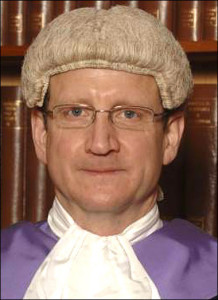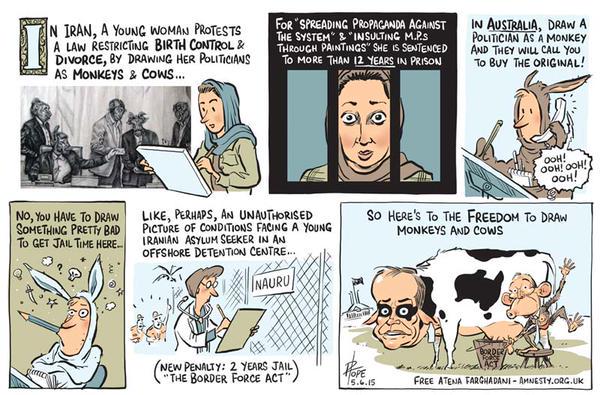Weekly Notes: legal news from ICLR – 12 June 2015
This week’s roundup of recent legal news and events includes a magna kerfuffle over Magna Carta, transparency in family law and the case of the missing mum, and some truly awful stuff going on in foreign legal climes. Magna Carta wars Octocentenary stirs up jurisprudential ding-dong There are three primary sources of law in this… Continue reading
This week’s roundup of recent legal news and events includes a magna kerfuffle over Magna Carta, transparency in family law and the case of the missing mum, and some truly awful stuff going on in foreign legal climes.
Magna Carta wars
Octocentenary stirs up jurisprudential ding-dong

There are three primary sources of law in this land. The first is legislation, which makes new laws or remangles old ones for modern consumption. The second is the common law, based on the case-by-case elucidation or declaration of otherwise not entirely self-evident rules and principles, via the application of precedent. And now, it has become clear, there is a third, based on myth, and perfectly exemplified by Magna Carta, an ancient document of which no original survives (only four rather moth-eaten copies) and most of which is no longer in force, but which nevertheless operates by a process of jurisprudential osmosis or a kind of super-strain of ancestral legal DNA, to engender and give force and credence to laws currently in force around the globe.
That, at any rate, might be the sarcastic view of those sceptical black-letter jurists who disdain the hyperbole surrounding what remains of this famous historical charter in its 800th year.
I count among the sceptics two erudite and eloquent debunkers, if they will permit me to call them so, namely Lord Sumption, Justice of the Supreme Court; and David Allen Green, legal blogger supreme. The latter, who also writes as Jack of Kent, got his retaliation in pretty early, a whole year ago in fact, with his piece on his FT blog: The myth of Magna Carta. He says Article 29 (the one about justice not being sold and trials being fair) is a “wonderful and rousing statement of the rule of law.” But you can’t rely on it in court and it won’t stop Parliament legislating against its effect.
In modern Britain, Magna Carta has all the legal and political force of an answer to a Trivial Pursuit question. […]
As a platitude, the principle set out in Article 29 of Magna Carta remains a crucial one; but Magna Carta is an absolute failure as a means of enforcing it. It does not help the litigant, and nor does it block the legislator. It may as well not be part of the law of the land at all.
Lord Sumption entered the fray in March this year, with an address to the Friends of the British Library, entitled Magna Carta then and now. He blames the “high-minded tosh” on a rogues gallery of ahistorical legal idealists starting with Sir Edward Coke (who famously said “Magna Carta is such a fellow that he will have no sovereign”) and going on to include the legal historian FW Maitland (who declared MC a “sacred text”), former prime minister Margaret Thatcher and our current prime minister, David Cameron, who
“armed with a copy of an Edwardian illustrated text-book for children, has called it the document that paved the way for democracy, equality and the rule of law, the ‘foundation of all our liberties’.
The history book in question is Our Island Story by HE Marshall, which Cameron admitted was his favourite boyhood reading. Sumption is himself a formidable historian of the late middle ages, and his address is energetically caustic but also well informed throughout. It makes for thoroughly entertaining reading. In his view, the fundamental problem for the myth-makers is that their view tends towards the Whig interpretation of history, according to which “things can only get better” (remember that?) whereas MC was framed at a time when the medieval mind was firmly rooted in the past, looking back to a golden age which they would never regain, often locating it in the reign of Edward the Confessor (ie before those pesky continental European lawmakers, the Normans showed up). They would not understand the inflated claims we now make for their expedient baronial treaty, which in Sumption’s view was “deeply conservative”.
Another historian who has come out hotly against the “legal idealists” is Sir David Starkey, who, according to Legal Cheek (who recorded extracts here) got into an on-air ding-dong on BBC Radio 4 Today on with Baroness Helena Kennedy QC, who is of what Lord Sumption would categorise as the “Magna Carta idealist” school of thought. She is by no means alone. One of the most prominent and senior in our current legal hierarchy is Lord Judge, a retired Lord Chief Justice, and a keen historian of the law who once confessed to reading ancient law reports for entertainment. In an address to Middle Temple in February entitled Magna Carta: Luck or Judgment, he propounded the view that Magna Carta survived as a charter, during a period when charters were more or less two a penny, to emerge as
“the first, and still to my way of thinking, the most important of all legal codes meriting the description ‘living instrument’.
He suggests that “the constant reissuing of the charter itself demonstrates its gradual evolution.” I think the evolutionary reference is interesting. My view is that misreading laws is a key element in their development: a not quite random mutation which leads to the survival of the fittest rules. The same is true of the common law generally. What survives is what recommends itself as most suitable according to the judicial mind of the day. (That is one reason why our choice of judges has a wider significance than pure merit, and would tend to support a more inclusive, and balanced, approach to their recruitment.) So maybe we should be asking Richard Dawkins about Magna Carta and its memes, and not bothering with David Starkey.
The charter was not the first such charter, as Lord Judge makes clear, citing others promising rights and freedoms that no one now harks back to. What it did, in four particular areas which he identifies, was to restate or codify principles that would have been recognised to those present as indisputable. As Lord Sumption points out, King John by his conduct “challenged his barons’ view of the law and failed”. His obligations were enforced against him, and with a “fanfare of spectacle and drama”. It was a public recognition of the fact that the king could not rule without the consent of what the social commentator Owen Jones (having inherited the phrase from Henry Fairlie – not, as I thought, Anthony Sampson) would now call The Establishment. (But not, as the humorous history book 1066 and All That pointed out, “the common people”.)

Owen Jones on Magna Carta: a striking example of useful myths is one of a collection of pieces by various writers in the New Statesman, who comment, in varying degrees of myth-sustaining or myth-bashing, on the 800th anniversary celebrations. Some of them are duly taken to task by Anthony Barnett on Open Democracy, From King John to Baron Bragg: celebrating Magna Carta. Mostly he seems to attack the commentators not for what they say, but for whether he thinks they believe in or live up to its supposed ideals, particularly as legislators, eg in the House of Lords. It’s not a pretty sight.
Coming somewhat later than his judicial brethren to the fray, Lord Neuberger, President of the Supreme Court, in his address to Lincoln’s Inn on 12 May, under the intentionally Pythonesque title, Magna Carta and the Holy Grail, is able to sum things up nicely:
The different perceptions of Magna Carta over time and the different perceptions of modern writers and speech-givers, whether historians, lawyers or conspiracy theorists, serve to reflect the Humpty Dumpty view of life: Magna Carta means what just what I choose it to mean…”
Finally, for a bit of light relief, try the Parliament Games quiz. If you know your stuff it should be a breeze, though it may make your toes curl.
Transparency: Delusions of Candour?
Cleaning the window may help public understanding, but it can also simply reveal the lack of clarity of whatever lies within.
That is one way of looking at it, at any rate.
The pros and cons of transparency in the family justice system were discussed in the blogosphere and on twitter this week, after solicitor John Bolch, on the Stowe Family Law blog suggested that it was probably futile. What he was talking about was the President of the Family Divisions practice guidance, requiring all family court judges to publish judgments on BAILII unless and to the extent that it might be necessary to protect the interests of vulnerable parties, such as a child in a care dispute. And, by extension, the activities of “well-meaning” bodies such as the Transparency Project, which exist to promote openness and public understanding of the family justice system.
It wasn’t that John Bolch was again transparency, per se. It was just that he felt it was a waste of time because the people who had decided the family justice system was a giant conspiracy were not going to change their minds to fit the facts, however much you disclosed them and put them in the public domain, and the press who wanted to sell papers were not going to abandon a good storyline just because the judgment was on BAILII.
Here is John Bolch’s original article: The transparency delusion
Here is my response on the Transparency Project blog: The Emperor’s New Clothes – or Delusions of Candour
Here is David Burrows’s response to my response: Family law: clarity first
David Burrows does not take issue with the idea of transparency, which I defend, but he wonders how useful it is when the law it opens up to public scrutiny is itself so unclear and therefore unsatisfactory. In this he certainly has a point. But I and the other members of the Transparency Project believe you can improve matters simply by exposing them. Sunlight is not only the best disinfectant, but it may provoke a bit of “good law” too.
Missing Mum – but no missing judgments
A good example of how transparency could benefit not just the media, but also actually help resolve an issue for the family caught up in a case, is the so-called “Missing Mum” case, this week. Rebecca Minnock took her 3-year-old son, Ethan, into hiding after a district judge had ordered that he should henceforth be cared for by his father. This was an unusual order but apparently justifiable in the circumstances because of the mother’s behaviour. More significantly, it was not the subject of any appeal by her. Instead, she simply absconded with the child, apparently with the assistance of members of her family. The case was escalated to a more senior judge, Judge Stephen Wildblood QC, who sat in Bristol Crown Court to issue collection orders and deal with contempt proceedings against those family members who had deceived the court or the Tipstaff who, with the police, were trying to locate Ms Minnock.

The case was the subject of maximum transparency, with all four (so far) of Judge Wildblood’s judgments being released on the Judiciary website: Williams v Minnock (unreported) Bristol Family Court, 8, 9, 11 and 12 June.
The first and second explain something of the background of the case, and the third is a short extempore judgment committing a member of the mother’s family, Andrew Butt, for contempt in breaching a collection order served on him, ie requesting his assistance in finding Rebecca Minnock, to which he responded with “a string of lies”. The following morning he and the maternal grandmother, Louise Minnock, were sentenced for their contempt – he got 28 days in prison, she got 10. In his fourth judgment the judge both admonished and attempted to reassure the missing mother, underlining the need to abide by the court’s decision in the best interests of the child and not take the law into her own hands. Later that day, in response to further appeals by the police, including on social media, Rebecca Minnock gave herself and the child up. Ethan is now reunited with his father. No one can pretend that everyone will live happily ever after but the crisis was at least resolved.
The immediate release of these judgments no doubt improved the quality of the reporting by the press, who were called in to help and were praised by the judge (in the fourth judgment, para 2) for having done so. It is likely that those reporters actually covering the case in Bristol Crown Court were assisted in the accuracy of their reporting by the presence there of Lucy Reed, a family barrister who blogs at Pink Tape, and who is also founder and chair of the Transparency Project. Writing up the case on the TP blog, in The missing mum case, she recorded the media reporters’ general unfamiliarity with the terminology and roles of those involved in family justice. (This may well be a legacy of decades of non-transparency; if you can’t report stuff, why would you learn the terminology and who’s who of it all?) At any rate, she seems to have enlightened some of them, because although the BBC when interviewing her on Radio 4 next morning persisted in using the outdated term “custody” for parental care, some of the press reports thereafter did seem rather better informed.
See, for example, this one in the Guardian, The Rebecca Minnock case: rare insights into the family court system
You can still listen to Lucy Reed’s interview on BBC Radio 4 Today programme on Friday morning (via i-Player radio): Family court process ‘can’t change parents’
Law (and injustice) from around the world
Azerbaijan
Clampdown on rights mars international games event
Currently hosting European Games in Baku, the oil-rich Caucasus nation has ruthlessly suppressed freedom of expression as 6,000 athletes from 50 nations compete under the sporting world’s gaze over the next fortnight. Last summer the Azerbaijani authorities embarked on a particularly aggressive roundup of prominent government critics, who were arrested and held in pre-trial detention. In the last two months, as the start of the European Games approached, some have had their pre-trial detention extended, others have been sentenced to lengthy jail terms.
Among those arrested is journalist Khadija Ismayilova, who has been imprisoned without trial for seven months, and faces up to 12 years if the politically motivated charges against her are “proved”. She has written from jail of her dismay that “things have never been worse” in her country, and the authorities “didn’t want you to see or hear us and our inconvenient truths”.
The chances of a fair trial for her and other detainees have been diminished by the simple expedient of locking up the lawyers too. Thus Intigam Aliyev, a prominent human rights lawyer who has successfully taken a number of cases against Azerbaijan to the European Court of Human Rights, was arrested in July last year on trumped-up charges of tax evasion and illegal business dealings. He was detained until his trial in April this year, at which he was given a seven-and-a-half year sentence.
Outside scrutiny has been minimised by, for example, cancelling a planned visit by Amnesty International, who were told by the government at the last minute that the mission had to be postponed until after the European Games.
Sources and more: The Times, Amnesty International
Greece
Shot migrant workers “fined” by court
In 2013 a group of 35 Bangladeshi strawberry pickers were shot at by their Greek farmer bosses when they went to complain that they had not been paid for six months’ labour. The case drew attention to the squalid conditions in which the migrant workers were forced to live. Last year, a court cleared two of the accused but convicted and sentenced two others for aggravated assault and illegal use of firearms. However, they were freed pending appeal.
Meanwhile, lawyers for the migrant worker victims applied to the Judicial Council that the judge was biased and should be removed. That application was rejected and in consequence the migrants have been handed a bill for costs amounting to €12,000. This is being reported in the press as a “fine” but it seems more like a punitive costs award. Not that that will comfort the migrant workers, who will have to pay about £260 each, unless the so-called fines are cancelled.
If this is Greek justice at its finest, at least it’s not something they can blame on the Troika (ie the EU, ECB, IMF), like all their other woes.
Sources: Daily Mail, Independent
Iran
Artist imprisoned for insulting politicians
Atena Farghadani, a 29-year-old painter and activist, was sentenced on 1 June to 12 years and nine months in prison, on charges of “gathering and colluding against national security”, “insulting members of parliament through paintings”, “spreading propaganda against the system”, “insulting the President” and “insulting the Iranian Supreme Leader”. The charges stem from her peaceful activities, including her association with families of political prisoners, her anti-government posts on Facebook and her artwork. She held an art exhibition in memory of those killed in the crackdown that followed the contested 2009 presidential election, and drew a cartoon that satirized parliament’s efforts to pass a bill that criminalizes voluntary sterilization and restricts access to contraception and family planning services.
Full report (with names and addresses to write to about her case): Amnesty International

Japan
Business or pleasure?
A husband who has sex with a woman other than his wife is not committing adultery if that other woman is a prostitute and the activity is paid for as a business transaction.
Judge Masamitsu Shiseki of the Yokohama district court so held, when rejecting a demand by a businessman’s wife for Y4m (about £21,000) in compensation payable in Japan by an adulteress to her lover’s wife. The businessman admitted that he regularly met a woman at an exclusive club in the Ginza district of Tokyo for sex, although the hostess denied sexual intercourse had occurred. The judge concluded the twice-monthly trysts over a seven-year period fell into the category of makura eigyo, or “pillow business”, which involved hostesses merely satisfying their clients’ sexual urges to keep their lucrative custom, and was “not something to damage the tranquillity of a marriage”.
The ruling has apparently devastated the private detective market.
Source: The Times
Saudi Arabia
The Kingdom lashes back
In response to recent statements by various countries and international organisations regarding the case of Saudi citizen Raif Badawi, the Royal Embassy of Saudi Arabia wishes to state that it has no tolerance for foreign entities meddling in the Kingdom’s internal affairs. The Kingdom will not tolerate such outrageous, ridiculous interference in its sovereign criminal justice system. [Extract from Statement from The Royal Embassy of the Kingdom of Saudi Arabia in London.]
Just wondering how the Kingdom views that form of interference represented by the attempts of a shadowy British business called Just Solutions International, to sell prison expertise to its “sovereign criminal justice system”.
According to its glossy brochure, Just Solutions international (JSi) is the commercial arm of the National Offender Management Service (NOMS) and specialises in Criminal Justice consultancy and the provision of offender management products and services to overseas governments. In other words, it’s a privatised offshoot of the Ministry of Justice, which is peddling “expertise” to the very Kingdom that thinks its “sovereign criminal justice system” is already perfectly good, thank you very much. So who’s ripping off whom? Are we (the British taxpayers who’ve funded this nice little set-up) being set up for a bunch of mugs? Or is it the Kingdom of perfection that seems to be paying for something it evidently doesn’t think it needs?
Not long ago (see Weekly Notes – 22 May), this same Kingdom was advertising for extra executioners, having a bit of a labour shortage in the head-chopping-off department. Is that something Just Solutions International might be able to help with? I have no idea, but I think we should be told. However, I feel it would be quite improper to ask, bearing in mind the lack of success of David Hencke, political journalist, whose FOI requests to Whitehall on the background to the setting up of Just Solutions International have met with a fairly solid brick, if not stone, wall, as he reports in Too expensive to reveal: The 2000 Whitehall emails on Just Solutions International
See also, Jack of Kent blog, Just Solutions International: a timeline
As for not meddling in the sovereignty of another country, what does Saudi Arabia think is the purpose of the United Nations Human Rights Council, to which it was elected in 2013, and of which it is applying to be the head later this year, when Germany retires from that role? Pretty pointless if you oppose “any form of external pressure that any entity may bring to bear upon its legal process”.
If you live in a glass house, go easy on the stoning.
That’s it for now. (Check for updates in the next day or two.) Enjoy the week ahead, and don’t forget to vote in our 150 Years of Case Law on Trial poll, now on its final stretch, 1996 to 2014.
This post was written by Paul Magrath, Head of Product Development and Online Content at ICLR. It does not necessarily represent any views of ICLR as an organisation.